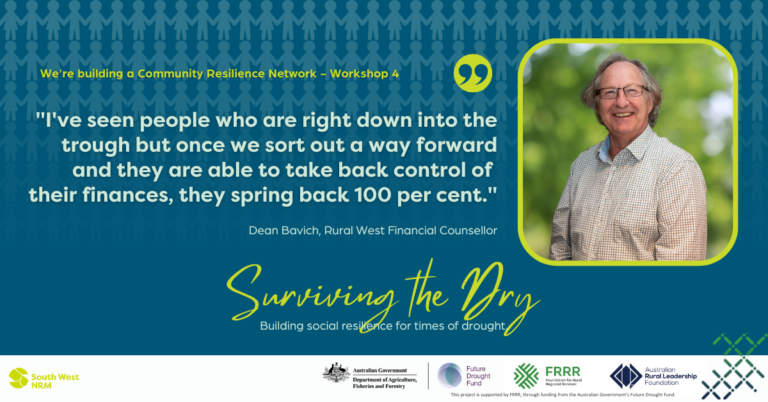
Guest Presenters
Dean Bavich – Small Business and Rural Financial Counsellor, Rural West.
Michael Monaghan – Farm Management Consultant, Farmanco.
When it comes to farmers and financial distress, early intervention is imperative, but prevention is even better.
These were the underlying messages from presenters at our latest workshop aimed at helping rural communities be resilient to the impacts of drought.
Dean Bavich is a Small Business and Rural Financial Counsellor with Rural West who helps farmers and small rural businesses in financial stress find a way forward.
“We work with the farmer and creditors to evaluate possible options and identify a clear direction. We become the third party,” he said.
One of the key approaches Dean takes with farmers is to externalise the problem to help them realise they aren’t the problem.
“We see a lot of indecision and the clouding or lack of clarity and the farmer not being able to make clear decisions and procrastinating. So we work on accepting the situation and finding clarity,” he said.
Another common response to financial stress was to stop communicating with banks and creditors, but this was never a good idea.
“These institutions need communication and they also want some sort of a plan,” Dean said.
“The bank may not accept the plan, but the fact that there is a plan is positive. We work with the enterprise to work out a plan that can appease the bank.”
Dean says it’s imperative that the farmer understands their financial situation and debt structure and be ready to act early when impacts like drought hit.
“Coming into a dry season with a high debt structure puts you behind the 8-ball from the start, and if you’re asking for help late, it’s very difficult to move forward. So early intervention is imperative,” he said.
Michael Monaghan is a farm management consultant at Farmanco who analyses farm businesses to work out how to allocate land optimally.
“The better and healthier the business can be, the more robust it will be when it suffers adversity. So, we break down the business into different costs types and different enterprises and through that matrix we work out where the opportunities are to save costs,” he said.
“Being able to pull things apart really helps in decision making. You’ve got to know what you’re making in different parts of the farm and then be prepared to make changes to areas that aren’t viable, profitable, and performing. What you can measure, you can manage.”
Farmanco is one of several farm consultancy businesses in WA that help with budgeting, feasibility studies and business planning and analysis. Michael also runs a business discussion group with six businesses who meet at one of the farms every six months.
“We pull the business apart and ask the hard questions,” he said.
“You’re working with people who are committed to continuous improvement. The more you question your own performance, share problems and ideas, and learn from peers, the more you can position the business to be ready for the next challenge.”
So, while Michael agreed that early intervention when farmers were under duress was important, prevention was even better.
“Do your planning and do your numbers and avoid the problems that are avoidable, because the unavoidable problems are enough for farm businesses to deal with. You’ve got to be committed to analysing where you’re going and enact change where change is required. Control the controllables.”
Dean outlined a range of support services available to farmers, including RIC (Regional Investment Corporation) loans and the Farm Household Allowance payment, which Michael described as “little free kicks” to help those under duress.
For a full list of support services collated at this and other workshops run through this project, click the button below.
